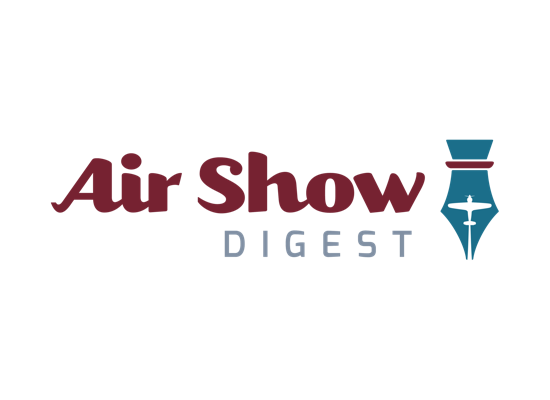Sometime shortly after the air show industry took flight 100 years ago, a performer posed a question that has gone largely unanswered over the subsequent century: “How do I get hired?”
An ICAS survey in the fall of 2009 shed some light on the subject, comparing and contrasting the viewpoints of performers as to how event organizers make their hiring decisions and what appeals to them from a promotional perspective. Leaving room for some performer perspectives that the criteria event organizers say they use in hiring performers might be somewhat different from the criteria they actually use, the gaps between the perceptions of performers and event organizers – between marketing myths and reality – would appear to open a window for performers who are willing to adjust their messaging and promotional tactics to the tastes of event organizers.
In short, based on both survey results and ICAS member interviews, many performers are marketing themselves based on a misunderstanding of how and why event organizers hire performers.
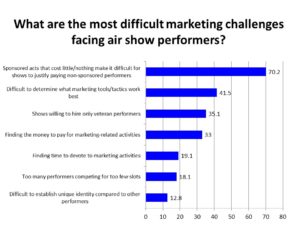
Ask performers what they see as the biggest challenges they face from a marketing perspective and atop the list is a perception that sponsored acts artificially reduce the competition and opportunities in the air show business (see Table A). Survey responses indicate that a full 70 percent of ICAS member performers believe that this is a primary challenge they face from a marketing perspective. Said one performer in the survey: “Sponsored performers or ‘hobbyists’ hurt the majority of performers by charging little or nothing for their appearances.”
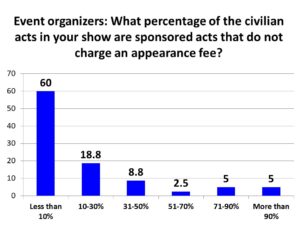
But event organizer responses suggest otherwise, with nearly 80 percent saying that sponsored acts comprise less than 30 percent of the acts that they hire and more than half saying that sponsored acts comprise less than ten percent of their show. (See Table B)
What are the other large marketing challenges do performers think they face in their efforts to get hired by event organizers? Next on the list is the process of determining what marketing tactics are effective (42 percent), followed by a sense that shows are reluctant to hire performers with whom they are not familiar (35 percent), and the costs associated with marketing (33 percent).
If finding the right marketing tactics is the challenge, then knowing how event organizers make their decisions should help performers craft some solutions.
Relationship-building is an absolute key, according to Rick Grissom, a former ICAS Board member and long-time air show producer. “I talk to people I trust,” he said. “I’ve been a pilot for 40 years, but I’m a long way from being the best judge of air show talent. Gene Soucy, Sean Tucker, Michael Goulian…I’ll ask them what they think. They’re going to give me an honest opinion. Then, I look at their ability and attitude…their ability in that box at low altitude, and how much have they flown in front of large audiences.”
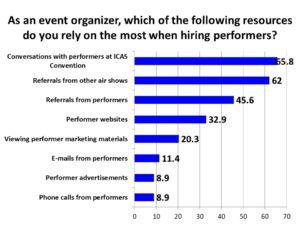
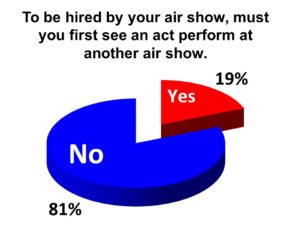
Indeed, a full 81 percent of event organizers indicate that they rely heavily on what they hear from other shows and performers in their hiring decisions. (See Table C) But do they have to see performers fly at another show before they hire them as many performers believe? Nope, just 19 percent of event organizers say that is a requirement (See Table D). Moreover, performers recognize that referrals – both from event organizers and other performers – are the most effective source of new business (see Table F) So, if it’s a word-of-mouth business and finding the right marketing tactics is a particular challenge, what are the other factors that contribute to the differences between myth and reality?
Here’s where it gets interesting. When you compare how performers indicate new business arrives to the marketing tactics they employ most regularly to the tactics that event organizers say will yield the greatest impact on them, a mix of marketing tactics emerges that should allow performers to break through to event organizers with their message.
First of all, any performer who is not taking full advantage of the ICAS Convention to spread their message is not utilizing the greatest marketing tool they have available. Nearly two-thirds of event organizers say they make use of the ICAS Convention in their hiring decisions (see Table C). This compares with nearly 69 percent of performers who say they get a booth at the ICAS Convention as part of their “marketing mix” (see Table E) and 45 percent of performers who say a convention booth is one of their most effective marketing tools (See Table F).
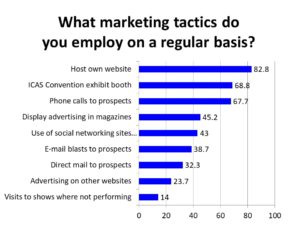
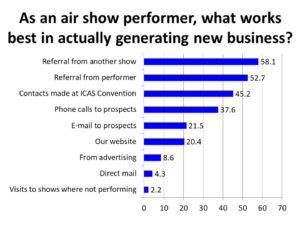
“We don’t always make a hiring decision right there on the exhibit hall floor,” said one event organizer who preferred to answer anonymously. “But the convention is our best opportunity to meet new performers and get to know pilots that we might have heard about from other ICAS members.”
Another disconnect is the percentage of performers, 68 percent, who say they use phone calls as a marketing tactic (see Table E) with just nine percent of event organizers suggesting they use phone calls as a determining factor in hiring performers (see Table C). Phone calls and e-mails can and should be used as follow up, and event organizers don’t mind hearing from performers, but the data suggests that it is a potentially serious mistake to build a marketing plan around these tactics. As important, the line between persistence and, well, obnoxious needs to be carefully monitored.
What else? Websites are important; 33 percent of event organizers use performer websites in their consideration (see Table C) while 83 percent of performers have their own website (see Table E) and 20 percent of performers cite their websites as an effective tool in generating new business (see Table F). Further, to paraphrase Mark Twain, reports of the death of direct mail would appear to be greatly exaggerated; 20 percent of shows use direct mail in making hiring decisions compared with four percent of performers who indicate direct mail provides them with new business.
During a seminar on performer marketing at the ICAS Convention in December, a panel of performers and event organizers agreed that marketing is—first and foremost—about building relationships, but that a mix of marketing tactics is necessary to build such a reputation.
In so doing, it would behoove performers to have a clearer understanding of the criteria event organizers use in making their hiring decisions. For instance, ask a performer what he views as the primary factor that an event organizer uses in hiring a performer and they are bound to say one thing: cost. And while he wouldn’t be entirely wrong – it’s the second most important factor according to event organizers – from a percentage standpoint, it represents one of three substantial differences, or myths, that exist between the perceptions of performers and the reality. Put another way, cost is certainly an important consideration to event organizers, but not nearly as important as performers believe it is and not nearly as important as other considerations.
Overcoming the myths, and building this new-found intelligence into their marketing messages, should help performers to make a better connection. Whereas 74 percent of event organizers say finding the right performer mix is a primary factor of hiring a performer, only 12 percent of performers would say that this is a primary factor in event organizer decision making. Fifty-six percent of event organizers say performers’ entertainment value is a primary factor in the hiring process, and just 13 percent of performers think so. And – get this – almost half (44 percent) of event organizers say that safety is a primary factor in the hiring decision while not one – Z-E-R-O – performer thought so. The message is clear: performers who refuse to acknowledge that they might not understand the hiring motivations of event organizers run the risk of compromising their marketability.
Instead, imagine a marketing message for a performer who’d previously had disappointing returns in his or her marketing that places new-found emphasis on his or her ability to fit within the mix of other performances of a show, which further emphasizes the full entertainment value of the performer, that pushes itself as a cost-effective alternative, and that places increased focus on safety as a bottom-line consideration. Now, maybe these messages aren’t breaking any new ground on their own, but the combined messaging would be hitting the sweet spot of what event organizers want to hear. Take that message and deliver it through the channels that event organizers say the favor and the statistics say that the needle should start to move.
Still, performers must also dare to be different with their marketing. Among the general advice that event organizers offer is to be different, unique; do your marketing well in advance of the ICAS Convention; make personal contact; but don’t be pushy or arrogant.
“I’m going to hire the guy who cares about the kids and spends more time signing autographs than in the bar,” said an event organizer. “The one who is ready to go to work for the show and not for themselves or their egos. There’s no room for ego in this business. Humble fun is what makes you attractive.”
Along the same lines, when citing the marketing mistakes that performers most often make, many event organizers suggested performers must take care not to be difficult, rude, or demanding, which is a red flag. Phone calls, while welcome generally, should be made judiciously—performers get a wide berth in this regard, but shouldn’t abuse the privilege. “Another mistake is not having enough information about your act,” said a performer.”
“Don’t take up too much of my time,” said another event organizer. “Don’t keep calling me or sending endless e-mails. If I’m interested, I’ll let you know. If you keep bugging me, you’ll never get hired.”
“Over-aggressiveness is a turn-off, especially if they haven’t built a reputation in the industry,” said Gayle Rawitzer. “There are performers — and I’ve had this happen — who ask why we don’t hire them for our show. Then they keep it up. You get a call from them once a month. There’s a point of being over-aggressive. That’s not just a turn-off; it’s almost a desperation factor.”
What’s the best marketing advice that performers offer to their brethren? Be professional. Build relationships and your network. Exhibit at ICAS. And hire professionals to do your marketing.
“Make sure you have entertainment, not stunts,” said a performer. “Be ready to mix it up with the crowd. Hang with the people that are paying you.” Said another, simply: “Don’t give up.”
In the end, there’s the whole chicken and the egg thing going on in marketing; you’re not going to get hired until people know who you are and you’re not going to become known until you’ve been hired and had the opportunity to work a few shows. Certainly, there are those unique acts that come around a few times every generation that are so transformational that they’re just going to succeed. For most performers, though, it takes time to build relationships and to get the right message out there to the air show community.

